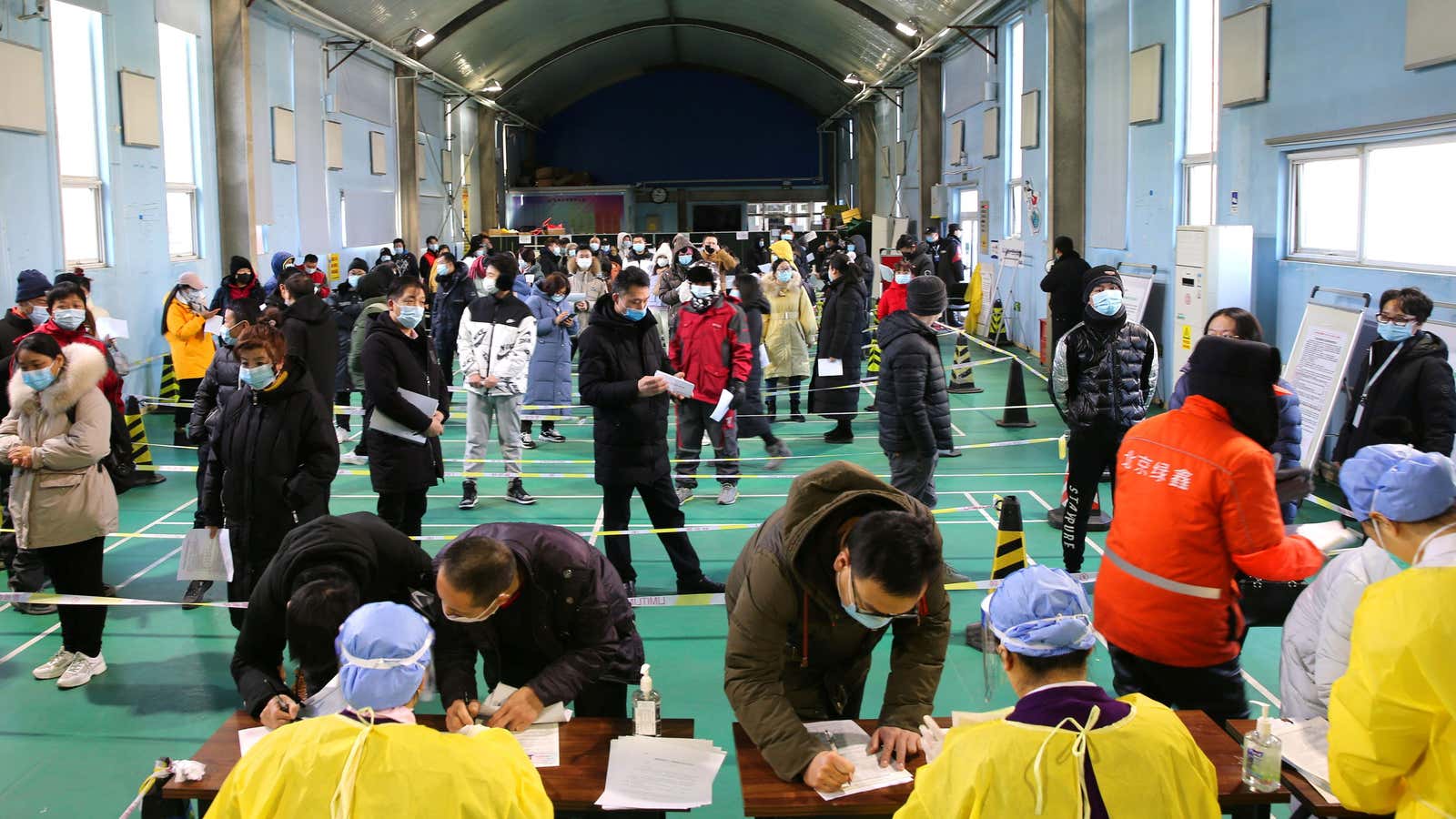Hello Quartz readers,
With global vaccination programs underway, Beijing is determined to set its own standards for the resumption of travel. During a March 15 press briefing, a foreign ministry spokesperson said China would begin providing a streamlined entry process for foreign nationals who have received a Chinese Covid-19 vaccine.
Amid global travel restrictions, China has for almost a year barred most foreign nationals. Those who can get in, usually for work, need to show a negative coronavirus test result and take an antibody test before boarding, as well as quarantine for at least 14 days after arrival.
A notice from China’s foreign affairs ministry in Hong Kong paints a clearer picture of the new process. As long as they have taken Chinese jabs, visa applicants traveling to mainland China for work will no longer need to present official invitation letters. Those who are permanent residents or family members of Chinese nationals, or who hold a special business travel card issued by the Asia-Pacific Economic Cooperation, can also file applications. The negative test result requirement and health and travel declaration form will be waived for applicants from these three groups if they have received a Chinese Covid-19 shot. The travelers still have to undergo a quarantine.
Chinese embassies in eight countries including the US and the Philippines have posted similar notices, although most still require applicants to have negative coronavirus and antibody test results or to fill out a declaration form.
The new policy rewards countries that are already using Chinese shots, such as Indonesia, Chile, and Turkey. And for nations weighing those shots, the visa policy could offer another reason to go ahead. China has approved four vaccines so far, including two made by state-owned pharma giant Sinopharm and Nasdaq-listed biotech firm Sinovac, respectively.
“Vaccine passports” already face criticism for exacerbating inequalities in international travel, as only wealthy nations have been able to stockpile doses for their citizens. Giving special privileges to travelers who have taken a certain kind of vaccine could add another layer of unfairness, or at least confusion, especially when there is usually little individual choice as to which vaccine to take.
The visa perk could also hurt China’s own citizens’ efforts to resume travel, if other countries were to reciprocally make visit rules more stringent for Chinese nationals who haven’t taken a foreign vaccine. (China is at present only using its own Covid-19 vaccines domestically.) But it may also not really help China in terms of restarting inbound travel: The country’s top sources for foreign visitors include South Korea, the US, and Japan, none of which are using China’s vaccines. —Jane Li
Three dinner-table convos
🛢️ Reducing emissions gets harder from here. In 1990, the UK was emitting about 794 million metric tons of greenhouse gases per year. Thirty years later, emissions are less than half that level, according to a new analysis, putting the country well on its way to reaching its legally-binding target of net zero emissions by 2050. But this progress could soon be reversed. With the economy poised to recover from the pandemic, and many of the lowest-cost carbon-cutting strategies exhausted, the second half of the UK’s emissions reductions will be harder to kick than the first.
💼 Working dads are starting to understand working moms. A recent global survey by Boston Consulting Group found that in late 2020, caregivers reported feeling more angst about their well-being than those without dependents. US-specific data also showed fathers were more likely than mothers to agree with statements like “I believe I am at a disadvantage compared to my colleagues who are not parents.” “I don’t think [men] have had to deal with this before,” says BCG’s Matt Krentz, who led the survey. “Now that they are experiencing it, and they see non-parents congratulated for really stepping up during the pandemic, they are worried about their own careers.”
💉 Europe has never been confident in Covid-19 vaccines. Europe’s problem getting vaccines into arms started long before anecdotal reports of potential side effects brought the distribution of AstraZeneca’s vaccine to a halt. Despite being some of the wealthiest countries to have access to Covid-19 vaccines, people living in some European countries have been among those least willing to take them, according to a study published by scientists based in Europe and the US in October of 2020.
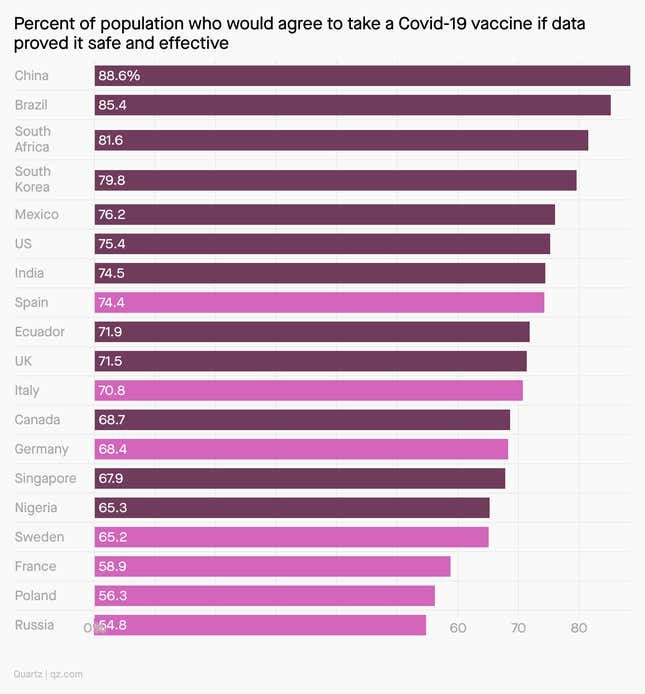
Quotable
“There is a loss of Covid-appropriate behavior. Now people feel that the pandemic is over because vaccines are here. So they fail to wear masks. We see large crowds gathering—again without masks. Many of these crowded events have become super-spreading events.” —Randeep Guleria, chief of the All India Institute of Medical Sciences
India seems to be edging closer to a fresh surge in Covid-19 cases. On March 21, the country registered 43,846 new cases of novel coronavirus infections, the highest daily spike of 2021. After the turbulent months of October through December, where new cases climbed because of India’s festive season, the months of January and February brought new infections to below 15,000 per day. But consistently rising cases since the beginning of March threaten to overcome those gains.
To that end, the Delhi Disaster Management Authority ruled this week that there will be no public celebrations for Holi.
The burnout files
Some 89% of people who responded to a Harvard Business Review workplace burnout survey said their well-being at work has declined since the beginning of the pandemic. Of those, 56% also reported increased demands in their job, and 25% said they were experiencing a loss of work-life separation.
But burnout was with us long before Covid-19, and the Quartz at Work archive is a rich source of guidance on the subject. Here are just a few of the articles we recommend:
- A psychologist explains how to deal with the symptoms of burnout
- A psychologist’s guide to coming back from burnout
- A plan for fighting burnout after a year of extreme stress
- Even small changes can help you combat workplace burnout
- The key to loving your job in the age of burnout
To get weekly missives on the modern workplace—and tips on surviving burnout in your day-to-day—sign up for The Memo, a weekly newsletter from Quartz at Work.
Vaccines with a view
Around the world, public gathering spaces that meet WHO criteria—accessible, clean, sheltered, large, and quiet—are being converted into vaccination centers. Quartz’s own Annabelle Timsit recently received her first shot in Westminster Abbey, where every British monarch since 1066 has been crowned, and where Queen Elizabeth II got married in 1947. Here are some other aesthetically interesting vaccination spots:
The crypt of Blackburn Cathedral, UK:
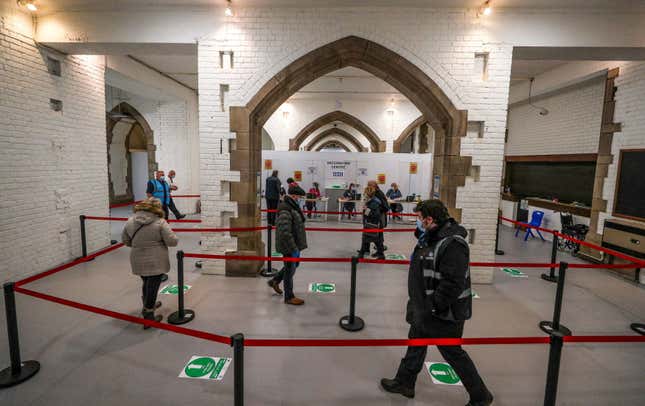
The Museum of the Republic at Catete Palace, Rio de Janeiro:
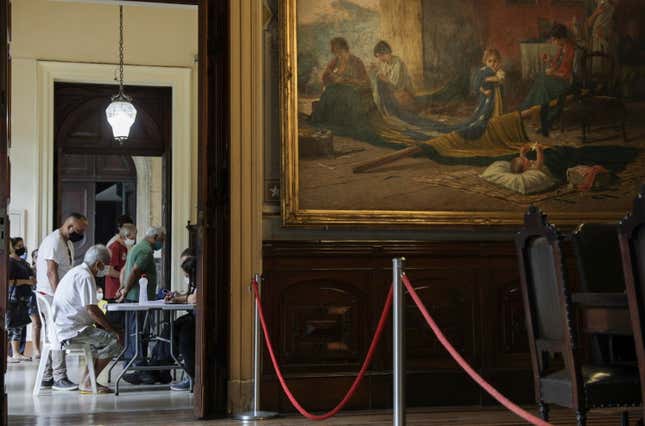
Stockholm City Hall, Stockholm, Sweden:
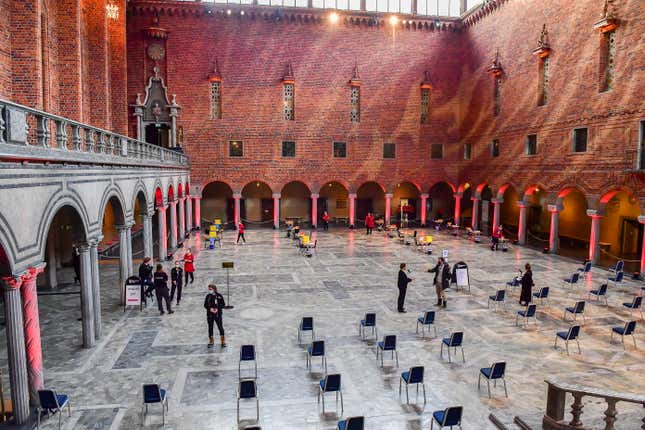
Yankee Stadium, New York City, US:
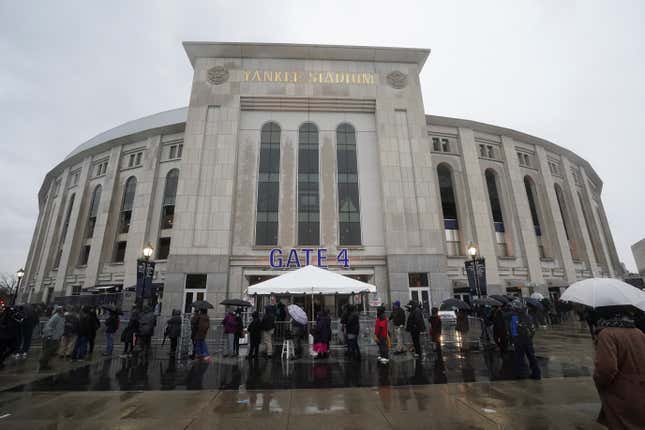
The Helix theater, Dublin, Ireland:
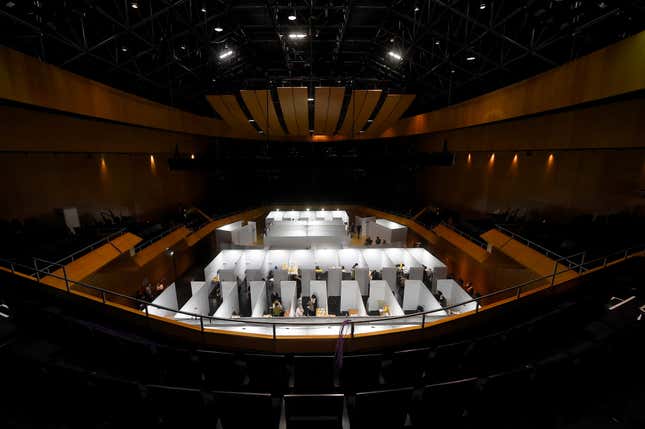
Essential reading
- The latest 🌏 figures: 123.9 million confirmed cases; 70.3 million classified as “recovered;” 458 million vaccine doses administered.
- Third time’s the charm? South Africa is racing to head off a deadly third wave.
- A healthy economy: The pandemic has created Africa’s next big investment opportunity.
- Minding the gap: A longer vaccine dose interval has more than one benefit for India.
- Pressing question: Can a new vaccine prevent opioid overdoses?
Our best wishes for a healthy day. Get in touch with us at needtoknow@qz.com, and live your best Quartz life by downloading our iOS app and becoming a member. Today’s newsletter was brought to you by Jane Li, Tim McDonnell, Lila MacLellan, Annalisa Merelli, Manavi Kapur, Annabelle Timsit, and Kira Bindrim.
